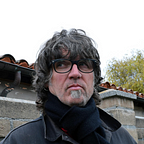The Comma, The Caesura, And Me
Thoughts on pause
There are, I suspect, as many instances of injecting pause into prose as there are definitions of what it means for poetry to have a “music.”
We have, of course, the literal definitions. Poetry with a distinct syntactical rhythm will often convey a sense of musicality.
Rhyme can transmit a similar effect as well—whether that’s musicality by association or not is hard to say, but regardless, the effect remains the same.
But what do we mean when we say a poem sings?
Once again, we have a certain literalism we can turn to—for example, in times past when oral transmission dominated, we didn’t even have the same distinctions between poem and song as we do today; in other words, or course a poem sang.
But in modern parlance, I think we mean something different. I think—when we say a poem sings—that we mean to communicate a sense of the poem having taken a kind of flight; of having lift; of having air in its wings.
This could be as simple as this: somehow, we feel the breath of the poem.
This isn’t as strange as it may seem. Poets have very specific tools that can be used to convey a breathing rhythm. The caesura, for example, is a kind of sanctified implement that poets from time’s dawn have…
